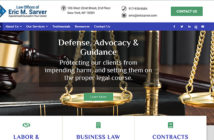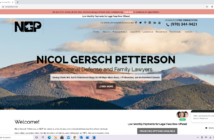13 lawyers weigh in on how they engage their audiences on Google+, what they get out of it, the biggest drawbacks, their use of Circles and Hangouts, and how they measure success.
Google is best known as a search engine. Over the years, Google have played around with social media platforms, but none of them had net positive receptions by their intended audiences. That is, until the introduction of Google+ in 2011.
It’s not really accurate to call Google+ a social networking platform, though it does have some useful social networking features. It would be truer to call it an online identity management system.
At the heart of the Google+ system is your author profile. Unlike many other systems, Google places no limit to how much information you can include in your profile, and if you target your Google+ profile well using relevant keywords associated with your business, then your profile will receive a huge boost in search engine visibility, which increases as you become more active on Google+. For that reason alone, Google+ has a distinct advantage over Facebook or Twitter.
Your Google+ profile is also tied to other Google services that you log into regularly. These include YouTube, Google Local, Google Play, Google Maps, Gmail, etc. If you have other Google accounts, they’ll all be connected to your Google+ profile.
Beyond that, Google+ has a ton of useful features that lawyers can use to promote their practices and attract new clients for their businesses. These include:
- Circles (for organizing your contacts)
- Google+ Pages
- Google+ Communities
- Google+ Hangouts and Hangouts On Air
- Google+ Events
- Google+ Local
- Google+ Apps
- Google+ Photos
- Ripples
To learn more about how solo lawyers and lawyers at small law firms use Google+ to promote their practices, I met with several attorneys who are members of the Lawyers on Google+ Community to ask them questions about how they engage with their audiences on Google+. The community was very open and the participating attorneys shared some great insights into how they use Google+ for their businesses.
Here is a list of participants who weighed in on the questions:
E. Ryan Bradley – Mr. Bradley is a personal injury lawyer in private practice in St. Louis, Missouri. http://www.stllawhelp.com/
Mark Markus – Mr. Markus is a private practice bankruptcy attorney in Studio City, California. http://www.bklaw.com/
Nicole Black – Ms. Black is a lawyer and author. She works at MyCase.com, a company that specializes in software for attorneys. http://www.mycase.com/
Samuel Edmunds – Mr. Edmunds is a partner in the Sieben Edmunds law firm in Minnesota. He specializes in criminal defense and personal injury. http://siebenedmunds.com/
Peggy Gruenke – Ms. Gruenke is owner of Legal Biz Success. She assists attorneys with management and business development tasks. http://legalbizsuccess.com/
Will Atkinson – Mr. Atkinson is a law, technology, and marketing associate with The Cochran Firm in Maryland. http://www.cochranfirm.com/
Rabeh Soofi – Ms. Soofi is a Los Angeles attorney in private practice. She represents individuals and businesses in a variety of practice areas. http://soofilc.com
Kasie Lee – Ms. Lee is managing attorney at Law Offices of Kasie W. Lee, a practice specializing in criminal defense and juvenile delinquency. http://www.kasiewlee.com/
Catherine Klasne – Ms. Klasne works at a mediation firm in Daytona Beach, Florida. (http://www.uww-adr.com/)
Jeffrey Taylor – Mr. Taylor is an attorney in Oklahoma City who specializes in consumer issues, immigration, personal injury, worker’s comp, and social security. http://absolutelawfirm.com/
Christian Denmon – Mr. Denmon is a courtroom attorney who specializes in DUI defense and divorce litigation in Tampa Bay, Florida. http://www.denmonlaw.com/
Gordon Firemark – Mr. Firemark is an entertainment lawyer in Santa Clarita, California. http://www.entertainmentlawupdate.com/
Dave Gormley – Mr. Gormley is a bankruptcy and real estate lawyer in south Maryland. http://southernmarylandlaw.com/
Interview participants were allowed to provide their input according to their timeline by answering questions in a round robin format within the Lawyers On Google+ Community. Here’s how the conversation played out.
How long have you been on Google+?
Ms. Gruenke: About two years.
Mr. Bradley: Three weeks.
Mr. Markus: About two years.
Mr. Edmunds: Three months.
Mr. Atkinson: I made a profile on Google+ when it first debuted but only really started engaging with it as a social media platform in the last six months.
Ms. Black: I joined Google+ within hours of it becoming available in limited beta in July 2011. I was fortunate enough to get an invite.
Ms. Soofi: I’ve been on Google+ for about six months. I started getting active on it because of how heavily Google rates activity on Google+ when ranking SERPs.
Mr. Atkinson, can you elaborate on why it took you so long to start using Google+?
Mr. Atkinson: Sure. Google+ initially struck me as an also-ran product. Google Buzz and Google Wave were underwhelming, and I wasn’t prepared to invest time and energy into something unless it blew me away. I didn’t see the powerful potential of Google+ until Google began integrating Plus results into search engine results pages and combining its Local service. In its initial iteration, the Hangouts and Photos features stood out to me but weren’t enough to convert me to an active Google+ user. It was the active user groups, integration into the SERPs, and Local integration that pulled me in a few years after the first product launch. There has also been a somewhat steady stream of content from the legal and SEO blogospheres admonishing those who aren’t regular Google+ users, so I thought I should give it another spin.
What made you decide to use Google+ for networking?
Ms. Gruenke: Why? Because it’s another platform for posting content that improves SEO, especially if you are going to take advantage of using local directories. I felt Google+ was an important community to join.
Mr. Bradley: Because of SEO only, with the naïve thought that I would not learn anything or like it. I was wrong. Some communities, like this one (Lawyers On Google+), are awesome. Some aren’t.
Mr. Markus: I just followed others into it. It seemed like a good idea because it was Google.
Mr. Edmunds: I had gathered that Google+ was just another necessary social media platform along with Facebook, Twitter, and LinkedIn.
Mr. Atkinson: Google+ is powerful because it has the potential to impact Google search results. It also seems to be a more professionally-oriented social network than Facebook and serves a distinct purpose from Twitter. Google+ provides the ability to publish long-form content and to disseminate it to a designated social “circle,” which I also value. Finally, Google+’s groups are an excellent way to gain online visibility and to network with associates.
Moderator: It’s important to point out that posting only to specific circles won’t help you with SEO, if that’s your goal. However, it does target your message more succinctly to the people you intend it for and is more likely to be read.
What would you say is the biggest benefit to using Google+?
Mr. Edmunds: Google+ hasn’t brought in more clients directly. Instead, it’s been a great clearinghouse of tips for web marketing, SEO, social media, etc. Lots of great ideas. Helpful for Google search results.
What is the biggest drawback to using Google+?
Mr. Atkinson: I’d say the biggest drawback is the interface. I’m not a novice or a technophobe, but I find the interface a bit clunky and confusing. Google’s integration of Local and Google+ has also been less than stellar. But overall, I think Google+ keeps moving in the right direction and won’t be going the way of Google Wave any time soon.
Ms. Black: For me, it’s the inability to use it from within my third party apps, such as Buffer. I share socially using a few tools, but Google+ doesn’t always play well with others so it makes it inconvenient for me. I often have to make special “stops” into Google+ to see what’s going on and to share.
Mr. Edmunds: The biggest challenge for me is the inability to combine accounts. I have had my personal Gmail for a long time. I first created my Google+ profile there. Then, three months ago we started Sieben Edmunds PLLC and we manage our e-mail addresses through Google Apps. Now I’m stuck with separate Google accounts and two different Google+ profiles. People constantly try to add my Sieben Edmunds PLLC Google+ accounts instead of the older personal one that I actually use. Maybe someone out there has a fix for this. It’s also challenging to figure out how to handle the firm’s Google+ page versus Google Places, etc.
Ms. Soofi: I agree with Ms. Black. It is definitely an impediment that Google refuses to share APIs with other providers to make it easier.
Mr. Bradley: The biggest annoyance is not getting alerts on my profile page that someone responded to a page post. Beyond that, sometimes I feel like I am neglecting my family by engaging on Google+.
Moderator: It is important to think your Google+ strategy through before opening up your account. The multi-account management mentioned by Mr. Edmunds is a sticking point for a lot of people. You can’t be logged into multiple accounts simultaneously unless you use two computers, so if your intent is to run a personal account and a separate account for your business, you should build a brand page for your business instead. Besides, Google+ frowns upon profiles for businesses and will delete your account if they see it.
What is your strategy for organizing circles on Google+?
Mr. Bradley: I will be the first to admit, when I joined, I thought the more people I circled, the better. I have a ton of people I don’t know in my circles and consequently get a lot of stuff I couldn’t care less about reading. I added most of them as “friends.” For this reason, I usually just go to the community I like and see what is being posted. So, if there is a way to uncircle someone, I am going to start “organizing” my circles with this.
Mr. Markus: Honestly, I wish I had one. I started putting everyone in a circle for “general business.” Next thing I know, I had over 1,000 people in it. I’ve very slowly started moving people to circles that are more relevant (e.g. bankruptcy attorneys, other attorneys, SEO, etc.) so I can view posts in those categories more easily. It’s very hard, when you have over 1,000 people in a circle, to find the ones you want because you have to click on their profile to see who they are and what they do.
Ms. Lee: The main problem I have is that everyone I’ve added ends up on Gchat, and I haven’t figured out how to change that.
Ms. Klasne – I’ve tried to avoid promiscuous circling. Right now, I have “following,” “customers,” “VIPs,” and “team members” as circles for my company page, and that seems adequate for the time being. Whenever I encounter anyone for the first time, I check out our contact list to see what the relationship might be and choose whether to circle and how to circle accordingly.
I haven’t targeted certain messages to certain audiences yet. Whenever I find anything interesting, I tend to spew it wherever it’s appropriate, but, particularly for VIPs, the ability to post and e-mail simultaneously may come in handy.
Mr. Bradley, is it safe to say, then, that you don’t do a lot of public posting, or posting to individual circles? Do you do most of your posting in communities?
Mr. Bradley: I post in the community that my post is relevant to. This way, it gets in front of people who might actually care and respond. Most public posts fall on deaf ears because of my indiscriminate circling.
What percentage of self-promotion do you do on Google+ versus sharing material created by others?
Mr. Edmunds: I haven’t got into a regular pattern on Google+. It’s been about 50/50, and that will be my goal going forward.
Ms. Black: On all social media platforms, I try to stick to the formula outlined in my book “Social Media for Lawyers” – only 10% of posts should be self-promotional.
Mr. Edmunds, what means do you have for ensuring you keep your ratio? How will you keep the balance in your promotional/third party-sharing posts?
Mr. Edmunds: Long term, I hope to have a system in place for scheduling posts at regular intervals. I bet Google+ or other apps have this type of capability. Perhaps someone can point me in the right direction on this.
Moderator: Hootsuite allows you to view messages people share with your pages but not your personal profiles. However, you can’t use it to post to your pages. Google Chrome has an extension called Do Share that allows you to schedule posts, but you have to have it open in order for the scheduled posts to post at the appointed time. As Ms. Black pointed out, third-party app integration with Google+ is a weakness.
Do you use Google+ Hangouts or Hangouts On Air for networking, conferencing, or meeting with clients? If so, how has it worked out? What specific suggestions do you have for Google+ newbies for employing Hangout strategies?
Mr. Atkinson: I’ve used Hangouts for meetings with other lawyers. My suggestion would be to test your connection before the meeting. Make sure your audio and video are functioning, and it works best if you have a connection speed of 5mb or higher.
Mr. Taylor: Here’s what I suggest:
- Good internet speeds – up and down.
- Get a quality camera (at least 720p) with a built-in microphone (eliminates the need for a headset, though a headset is fine).
- Find a well-lit room to perform the Hangout. I’ve been in sessions where you can’t see some of the users.
- Have as few distractions as possible. This means no kids, dogs, televisions, or other habits. I once watched one participant smoke three cigarettes on a Hangout. Disgusting.
- Have a theme for the Hangout. There’s a lot of “let’s talk about stuff” Hangouts. They never work.
- Remember, only ten people can be on at a time, so it’s best to do a Hangout On Air if you want to make it more public.
- Hangouts aren’t private, especially Hangouts On Air. If you want encrypted communications, try zoom.us. Plus, Zoom allows up to twenty-five participants.
- Make sure all participants commit to the Hangout for the total time. Too much coming and going is distracting, unless you mention their departure.
Ms. Black: I rarely do. Sometimes I do with my MyCase colleagues in California, but we usually use a different platform for meetings.
Do you have a brand page for your practice? If so, how has that worked for you and what suggestions do you have for other attorneys who are planning to build a brand page?
Mr. Markus: I created one, which I’m also using as my “rel=publisher” page, but, honestly, I have no clue what to do with it. I’ve just been posting my articles there, as well as all my other Google+ pages.
Mr. Denmon: I have one, and like Mark Markus, I do not know what to do with it. I already have Google+ pages for my offices, etc.
Mr. Markus: According to steadydemand.com, only posts made on brand pages count toward rankings. So I guess any +1s you get by sharing from your personal stream don’t help at all. That might explain something. Although most of the communities I belong to restrict membership to individuals.
Moderator: Brand pages are useful for branding. You can’t have a Google+ profile in a business name, so if you want to use your account for business, then you need a page. However, personal accounts are just as good for SEO as brand pages. However, Mr. Markus, you are correct that +1s don’t do much for SEO. You’ll have to decide if it’s more important to you to brand your practice in your personal name or your business name.
Mr. Gormley: We have two offices and a brand page for each. The reason we set up two pages is so we would show up on the map for searches for Lexington Park and for Waldorf. We share a blog post from our website and push it out to our pages. Originally, we were not going to have the firm comment or share posts, be we decided that it doesn’t hurt to have our pages show a little personality.
When it comes to measuring success on Google+, what specific things do you do to measure, and how? What metrics are important to you?
Mr. Bradley: I don’t look at any specific metrics, but then again, I just started using it about a month ago. Right now, I am satisfied knowing I engaged in a meaningful conversation and that I learned something.
Mr. Atkinson: How many +1s, comments, and other interactions I receive are the most important metrics. I measure metrics through the “insight” tab of the Google dashboard.
What final tips do you have to offer lawyers on Google+ that might not apply to other types of businesses?
Mr. Bradley: Watch what you put on here. Your web company may read it and fire you before you fire them. Opposing counsel may follow you as well.
Mr. Firemark: Don’t be typical. Be a real person and share content that has real value. Most lawyers on Google+ seem to be posting the same kind of “Can I recover …?” question and answer posts and they come across like ambulance chasers. Post interesting, valuable content thatillustrates your depth and that you’re multi-dimensional.



